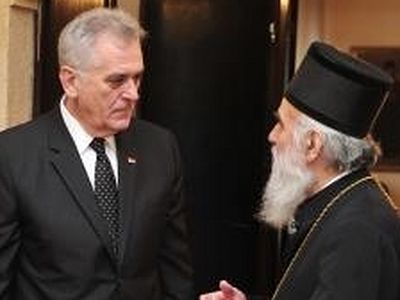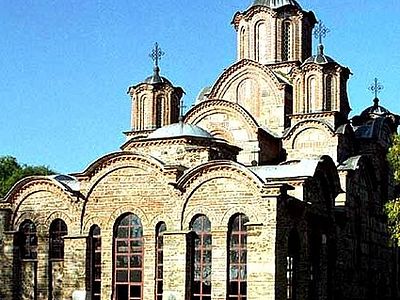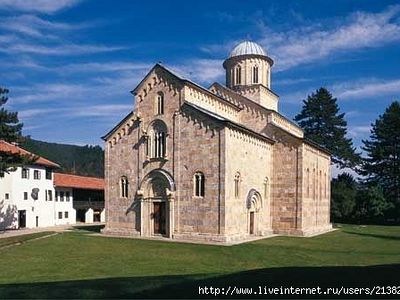Source: Save World Heritage
November 1, 2015
Fr. Sava Janjic, the Abbot of Visoki Decani Serbian Orthodox Monastery, the first UNESCO World Cultural Heritage site in Kosovo has released a video concerning Kosovo's bid to join UNESCO and the danger this poses to the Serbian spiritual and cultural treasures in the area. The video and text can be viewed here:
I am taking this opportunity to convey most serious concerns Kosovo’s UNESCO bid has created in my Church and our community. As Kosovo has been a spiritual center of Serbian Orthodox Church since XIII century with tombs and relics of our Archbishops in our most holy shrines, our primary concern has always been to protect these holy sites. It is exactly due to danger our holy sites have been facing in the last 16 years that our UNESCO World Heritage Sites, all four of which are Serbian Orthodox churches, are also inscribed the List of the World Heritage in Danger. Regular attacks, verbal provocations amid the general atmosphere of intolerance have made it necessary our most important sites in Kosovo still remain under a special security regime by police and International peacekeepers.
Regrettably, AFTER the war in Kosovo, unlike other civil-wars in Former Yugoslavia, particularly in Bosnia, in which vandalism of holy sites stopped after the end of hostilities, 150 Serbian Orthodox Churches and nearly 400 Serbian Orthodox Christian cemeteries in Kosovo have been destroyed or seriously damaged since the beginning of the UN peace mission in Kosovo in June 1999. Only in two days in March 2004, 34 of our holy sites were torched by thousands of Kosovo Albanian rioters. We had no help from that time and currently the same Kosovo leaders and Kosovo provisional institutions, except international troops NATO led troops of KFOR, which protected our most important shrines. My monastery, a XIV century site alone has been attacked by grenades four times since the end of Kosovo war in 1999, and that is the reason we still remain under a tight NATO protection.
Of course, we can say that this is all past, but acts of continual low-level vandalism of our churches and cemeteries have continued and so far and Kosovo authorities are not able to stop it amid the pervading atmosphere of anti-Serb feelings fueled by media and irresponsible statements. Several days ago two more Serbian churches were burglarized. We are particularly hurt by attempts of some Kosovo Albanian intellectuals who actively work on historical revisionism and are trying to rewrite the history and change the identity of our sites although numerous international authors have written about these pearls of medieval and Christian tradition, built by Serbian medieval king, which have an important place in the European medieval history. Many young Kosovo Albanians still learn in their schools that we, Serbian monks who have been living here for hundreds of years, occupied what they call ethnic Albanian monuments and sites, which is historically preposterous and additionally incites ethnic and religious hatred.
We are seriously concerned with Kosovo UNESCO bid, not because we are against promotion of culture and education in Kosovo, but primarily because we find it very hard to trust Kosovo institutions. Striking discrepancy between their official statements pledging us full protection in their statements to international media and the latest utterly discriminative draft laws on Culture and Cultural Strategy of Kosovo, give a completely conflicting idea of what Kosovo authorities might do if they are granted full UNESCO status. Instead of being a mechanism of protection UNESCO membership can easily become a mechanism of cultural repression.
We as a Church, are not motivated by political reasons, although, Serbia and many countries which have not recognized Kosovo’s independence, remain deeply concerned that Kosovo in organizations like UNESCO might be a serious precedent which can encourage separatism in their own countries. Kosovo is still not recognized by all EU member-states and is not a member of many international organizations for that particular reason. After all, our heritage is not only our Church heritage but the heritage of all Serbian people which we have protected and cherished for centuries, particularly during 5 centuries of Ottoman rule in the Balkans
That is why we as a Church believe that Kosovo’s membership in UNESCO should be postponed until Belgrade and Pristina within the EU sponsored dialog in Brussels clearly define mechanisms of institutional protection of our holy sites in Kosovo with all international guarantees. This should be done in order to avoid our holy sites becoming a target of nationalists and historical revisionists as current Kosovo legislation is not precise enough and may be a subject of unilateral change. Renaming our sites into “Serbian Orthodox Medieval Monuments in Kosovo” by UNESCO may be a first step in that direction, to clearly signify the religious affiliation of these sites,… like for example Armenian Monasteries in Iran.
The Brussels dialog between Belgrade and Pristina is a crucially important process the goal of which is to promote confidence and resolve all practical problems our communities are still facing. After all, both Belgrade and Pristina look forward towards European future of the region and we as a Church strongly believe that our Serbian Orthodox Heritage in Kosovo should be not a stumbling stone of political confrontation but rather a bridge between communities and all peoples of good will that are looking for their common future in Europe. After all, that is the true meaning of religious and cultural sites anywhere in the world, to promote understanding and confidence and not the opposite.
Our Church looks into future but we all in Kosovo cannot forget the wounds of the past. As my monastery sheltered Kosovo Albanian refugees who suffered during the war, we know all too well how sad it is for many Serbian refugees that had to flee after the Kosovo war and are not able to return to Kosovo 16 years after the end of hostilities. We still have many churches ruined since 1999 to rebuild, many cemeteries to repair and help everybody in Kosovo and the wider region live in peace and mutual understanding. That is why we remain open for dialog. In that context any political decision, which may jeopardize the prospects of dialog, will be detrimental for all.
With this message I express sincere hope in the name of my Church that UNESCO will postpone Kosovo’s UNESCO bid to encourage dialog and protect cultural heritage particularly in this part of the world where it is still in danger.
* * *
For more information please visit the Save World Heritage main page.



